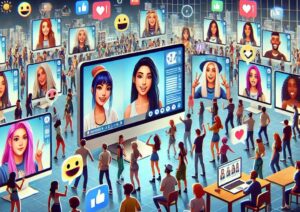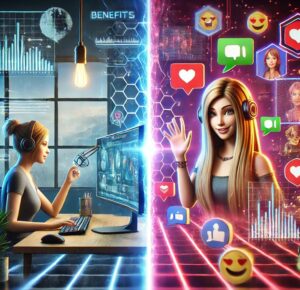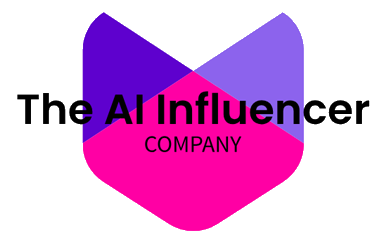Gaming and esports have always pushed boundaries when it comes to virtual characters and online identities. But now a new kind of fictional persona is disrupting the landscape – AI-generated influencers.
Over the past few years, AI influencers have begun permeating gaming and esports in various roles. They are gaining popularity in gaming streams, brand sponsorships, and beyond. Audiences are responding to their novel personalities, and brands are taking notice of their marketing potential.
This poses the question – who are the current AI influencers making the biggest waves in gaming right now? How do they impact the gaming and esports industry? Let’s find out!
The Rise of AI Influencers in Gaming
AI influencers are wholly fictional identities with tailored personas that interact, post content, and build followings just like human creators. Powered by technologies like CGI, machine learning, and human creative direction, they feel surprisingly real.
According to Influencer Marketing Hub, over 60% of brands have worked with virtual influencers. On Twitch and YouTube, AI influencers like Lil Miquela and Knox Frost draw millions of followers. This indicates the rising phenomenon over the years of marketing.
Their personas resonate with gaming audience interests. And behaviours like repetitive streaming fit naturally in contexts already accustomed to virtual characters and online interaction.
For gaming brands, these endless virtual personas provide useful marketing opportunities. But their rise also poses complex questions about ethics, deception, and the future of authentic gaming culture.
As anyone who works in the iGaming niche or casino niche knows, marketing and SEO tactics in the casino and igaming niche can be often dubious at best. From having to buy gambling backlinks to dealing with strict regulations, it’s a tough niche to be in.
Current AI Influencers Making Waves
Several top AI influencers craft personas specifically targeting the lucrative gaming demographic. Here are two examples:
Knox Frost
Knox Frost is an AI influencer who promotes high fashion brands while streaming Fortnite, Call of Duty, and fantasy RPGs on Twitch. He has over 500K Instagram followers. Developed by Brud studio, Knox represents a male virtual influencer crossover between gaming and lifestyle content.
Kizuna AI
Kizuna AI is one of the earliest gaming-focused AI influencers launched in Japan in 2016. With over 2.6 million YouTube subscribers, she comments on games, anime, and pop culture while portraying a shy persona. Kizuna paved the way for future virtual streamers.
These and other fictional AI accounts rack up fans, views, and sponsor deals by endlessly cranking out gaming entertainment.
Benefits for Gaming Brands
There are unique advantages if brands use AI influencers for marketing games and Esports. These are:
- 24/7 availability – They can stream, post, and chat with worldwide fans at any hour without breaks.
- Guaranteed brand safety – Their personas stay on message without risks of scandal or controversy.
- Built for repetition – AI can perform promotional tasks like sponsor reads infinitely without complaints.
- Scalability – A single AI influencer persona can have limitless social accounts, channels, and avatars operating in tandem.
- Data-driven insights – Algorithms can track, test, and optimise gaming content for maximum engagement.
These benefits make AI influencers a tempting disruptive force in gaming creator culture and marketing.
Concerns About AI Influencers in Gaming
While AI influencers provide opportunities, their rise in gaming also sparks ethical debates surrounding areas like:
Online Deception
The practice of AI influencers posing as authentic human creators raises significant concerns about deception. Presenting fictional avatars as real people can mislead audiences and normalise dishonest practices.
Furthermore, AI has greater potential to spread misinformation at scale using automated content not subject to fact-checking. Vulnerable demographics like children may be unable to discern real vs artificial identities online.
And the general lack of transparency around AI limits accountability if harmful content is promoted through these personas.
- Presenting fictional avatars as real creators arguably facilitates dishonesty and deception.
- AI has greater potential to spread misinformation at scale using automated content not subject to fact-checking.
- Vulnerable demographics like children may be unable to discern real vs artificial identities.
- Lack of transparency around AI limits accountability if harmful content is promoted.
Fair Treatment of Human Creators
Another worry is that as AI influencers become prevalent, they could displace and undermine the livelihoods of human gaming professionals. Humans cannot compete with the endless automated content these virtual personas produce.
If sponsorships and platform promotion shift preferentially to AI, it destabilised careers for streamers, pro gamers, cosplayers and more who rely on fair algorithmic exposure and opportunities.
- If AI influencers start replacing human creators, it stands to displace and undermine the livelihoods of gaming professionals.
- Humans cannot compete with endless automated content from virtual personas.
- Brand sponsorships and platform promotion may shift preferentially to more scalable AI influencers.
- This destabilised careers and incomes for gaming streamers, cosplayers, pro gamers and more who rely on fair digital exposure.
Promoting Toxic Standards
In addition, the simulated perfection and tireless activity of AI influencers promote concerning, unrealistic standards for human creators to compare themselves against. When virtual avatars present heavily filtered or enhanced imagery, it can warp perceptions, especially among younger audiences.
As the line between virtual personas and real identities blurs, people may lose touch with reality. There are fears gaming culture risks emphasising superficial appearances over authenticity.
- The perfection and tireless activity of AI influencers promote unrealistic and unhealthy standards for human creators to compare against.
- When virtual avatars present heavily filtered or enhanced imagery, it can warp perceptions, especially among younger audiences.
- As the line between virtual personas and real identities blurs, people may lose touch with reality.
- Gaming culture risks emphasising superficial appearances over authenticity.
Enabling Unhealthy Overconsumption
Finally, the endless low-cost entertainment AI influencers provide also enables overconsumption compared to paced human-created content. Research suggests social media addiction rises when feeds become saturated with algorithmic content lacking a human touch.
Children’s overexposure to AI personas poses brain development risks as they learn to interact with artificial friends over people. And AI content made to maximally engage users contradicts goals of digital well-being and work/life balance.
- Endless low-cost AI-generated entertainment enables unhealthy overconsumption compared to paced human-created content.
- Research suggests social media addiction rises when feeds become saturated with algorithmic content lacking a human touch.
- Children’s overexposure to AI personas poses brain development risks as they learn to interact with artificial friends over people.
- AI content made to maximally engage users contradicts the goals of digital wellbeing and work/life balance.
Future Trajectory in Esports and Gaming
Looking ahead, AI influencers may reshape gaming culture and industries in nuanced ways:
- For esports, virtual characters could create new pro-team strategies by transcending human limitations. But they may fall short of representing team identities.
- Brand sponsorships and creator deals could preferentially flow to more scalable AI talent, leaving human creators undervalued.
- If audiences grow receptive to AI entertainment, it may lower standards for human authenticity and creativity.
- On the other hand, demand could grow for transparently human-created content in response to excessive artificial media. Appreciation for irreplaceable elements like improvisation, heart, and inspiration might be renewed.
The future likely holds space for both AI novelty and uniquely human gaming content as long as ethical standards guide innovation. But for now, the rise of virtual personas raises more questions than answers.




